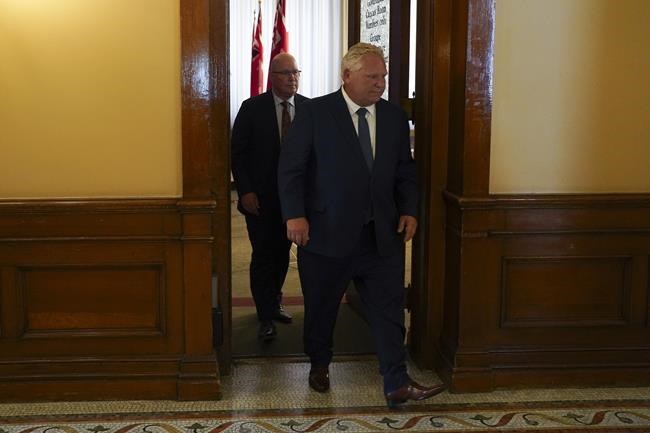TORONTO — The Ontario Integrity Commissioner said it has begun reviewing a request from Premier Doug Ford's office to investigate a senior aide about his role in selecting which lands in the protected Greenbelt would be approved for housing development.
Ontario's auditor general found the province's decision to open up the Greenbelt favoured certain developers with ties to the housing minister in a process that disregarded or ignored possible environmental, agricultural and financial risks and impacts.
Auditor General Bonnie Lysyk recommended the province ask the integrity commissioner to determine if Housing Minister Steve Clark's chief of staff, Ryan Amato, acted contrary to the Public Service of Ontario Act.
Last year, the province took 7,400 acres of land out of the Greenbelt and replaced it with about 9,400 acres elsewhere. About 83 per cent of the removed land is considered the highest quality farmland in Ontario.
Ford admitted that the process of selecting which lands would be removed from the Greenbelt for development was flawed and pledged that his government would act on 14 of Lysyk's 15 recommendations. But, he said, his government had not accepted Lysyk's recommendations to re-evaluate the entire process of modifying the Greenbelt's boundaries.Â
Amato told the auditor general he received packages from two prominent developers at a conference dinner last September that included proposals to build homes on protected Greenbelt land owned by those developers.Â
Amato told the auditor general he did not disclose to the developers that the province would open up the Greenbelt.
Lysyk said the developers who had access to Amato at the dinner ended up with 92 per cent of the land that was removed from the Greenbelt.Â
Amato did not immediately respond to a request for comment and an automatic return email said he is out of the office until next week.
Ford's office appointed Amato as Clark's chief of staff in July of 2022.Â
Both Ford and Clark said this week they were unaware of the details of the Greenbelt land swap.
Ford said he learned of the land swap the day it went to cabinet for approval, while Housing Minister Steve Clark said he learned of it the week prior.Â
Lysyk said Clark should have known about the details of the land swap.Â
Myer Siemiatycki, a professor emeritus of politics at Toronto Metropolitan University, said the notion that the premier and Clark had no knowledge of how Amato was handling the Greenbelt land development process strains belief.Â
"It's inconceivable that such a key issue as the future of the Greenbelt would have simply been assigned to someone as low down the scale in the power or pay grade of the Ontario government as a chief of staff," he said.
"It strains credulity to believe that a chief of staff was given full reign on which of the thousands of acres of Greenbelt land should be converted into residential housing."Â
Lysyk found Amato had formed a small team of public servants to look at specific sites and if some of those did not meet the criteria for selection, such as for environmental reasons, the criterion was simply dropped, rather than selecting a different site.
In selecting the areas where development would ultimately be approved, Amato used the packages he received from developers, the auditor general found.
"The housing minister's chief of staff provided hard-copy information from packages he received on eight sites to the Greenbelt Project Team on October 6, 2022," Lysyk wrote.Â
The province's housing task force had previously said in a report that the Greenbelt land was not needed to achieve the province's goal of building 1.5 million homes over 10 years.
"Land is available, both inside the existing built-up areas and on undeveloped lands outside the Greenbelt," the task force found in February 2022.
Lysyk and her team spoke to the chief planners in the three regions, Hamilton, Durham and York, where all 15 sites in the Greenbelt were removed.
"They informed us that sufficiently serviced (or more easily serviceable) land is already available to meet the housing targets assigned to them by the housing minister," the auditor's report said.
"The Chief Planners we spoke to also highlighted that the land sites removed from the Greenbelt in December 2022 were largely not serviced, were not in their servicing plans, and that many of the land sites would be challenging to prioritize and service in the near future, with some taking potentially 10 or more years to accomplish."
The Ontario Provincial Police is aware of the auditor general's report, a spokesman for the force said.
"At this time, there is no change in status in terms of the ongoing review of the matter by the OPP Anti-Rackets Branch," Bill Dickson said.
This report by The Canadian Press was first published Aug. 10, 2023.Â
Liam Casey, The Canadian Press
Note to readers: A previous version of this story erroneously referred to hectares instead of acres in noting how much land was removed from the Greenbelt and replaced.




